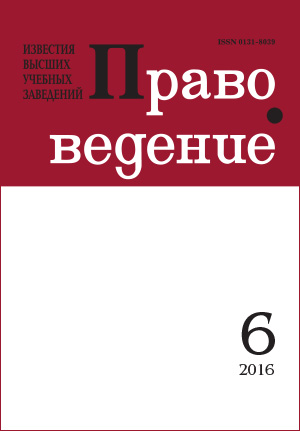Эрих Юнг о национал-социалистической концепции источников права
Аннотация
Статья представляет собой попытку исследования нацистского тоталитарного подхода к важнейшей проблеме теории права — источникам права. Данная проблема рассматривается на примере работы «Учение об источниках права и еврейство» пера одного из видных немецких юристов, поддержавших нацистский режим, Эриха Юнга. В статье исследуются воззрения Юнга на судебное правоприменение, справедливость, позитивный закон, обычаи как источники права. Анализируется критика Юнгом исторической школы права, естественного права, позитивистского правопонимания, школы свободного судейского усмотрения, общего права. В работе делаются выводы о создании Юнгом и другими немецкими юристами Третьего рейха юридического новояза, призванного придать правовое оформление ключевым идеологическим постулатам нацизма, в частности идее народной общности, понимаемой в расовом смысле, и обосновать интересы этой общности в качестве высшего источника права. Неприятие нацистской идеологией позитивистского правопонимания обусловливалось деидеологизацией права позитивизмом, особенно в его кельзеновской интерпретации. Наиболее формально близким к нацистскому пониманию источников права является естественное правопонимание. И в нацистском, и в естественном правопонимании высшими источниками права выступают базовые априорные принципы, на которые законодатель не вправе посягать, но с той фундаментальной разницей, что в естественном праве эти принципы выстроены вокруг гуманистических начал прав и свобод человека и гражданина, а в нацистском — вокруг интересов основанной на расе народной общности. Также в работе выделяются позитивные аспекты воззрений Юнга на источники права. К ним стоит отнести апологетику независимости судебной власти и свободу судейского усмотрения. Однако в правоприменительной практике Третьего рейха свобода судейского усмотрения означала свободу в наказании противников режима, включая применение норм уголовного права по аналогии.
Ключевые слова:
источники права, историческая школа права, судейское усмотрение, естественное право, справедливость, законотворчество, позитивизм
Скачивания
Библиографические ссылки
Загрузки
Опубликован
Как цитировать
Выпуск
Раздел
Лицензия
Статьи журнала «Правоведение» находятся в открытом доступе и распространяются в соответствии с условиями Лицензионного Договора с Санкт-Петербургским государственным университетом, который бесплатно предоставляет авторам неограниченное распространение и самостоятельное архивирование.




